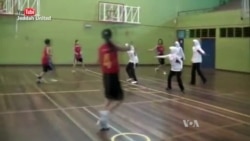Twenty-year-old Nour Gary has been playing basketball for 10 years, but her father has never attended her games. Men are not allowed courtside during women’s games in Saudi Arabia, so she plays with her father privately for fun.
All women who play sports in the kingdom need permission from a male "guardian," usually a father or husband. Some parents refuse, Gary said, but hers are happy to oblige.
“They are enthusiastic about me playing and doing some things other than sitting around watching TV or going out," Gary told VOA.
Women’s rights in Saudi Arabia have come far in recent years, other players said, but many basic freedoms, like the right to drive cars or make major decisions independent of their male guardians, remain elusive.
On the front lines of breaking traditions that quash women’s voices are growing numbers of female athletes, according to Lina Almaeena, head of the Jeddah United Sports Company, which runs a women’s basketball team.
“It is really happening as we speak now,” she said. “History is really happening.”
In the coastal city of Jeddah for which her team is named, her players said that by connecting sports to health issues, other women and girls are inspired to exercise.
International matches also chip away at the image of Saudi women as virtually silent members of their society, Almaeena said.
Wearing white uniforms with long pants and Islamic headscarves, the Jeddah United women’s team plays against teams around the world. By playing in other countries, Saudi women broaden their own horizons as well as those of the nations they visit.
“We played in the United States, Malaysia, in Jordan and the UAE, as well as Riyadh and other cities in Saudi Arabia,” Almaeena said. “So we do that to promote sports locally and internationally to try to change stereotypes and show a different segment in Saudi Arabia.”
Not all agree
At an event in Jeddah promoting sports for handicapped boys and girls, female basketball players volunteer, cheering on competitors and helping them reach the finish lines.
The children here face some of the same issues Saudi women deal with regularly, like isolation from public life, said Daniah Ghandour, an education consultant for the Help Center, the organization hosting the event.
“I wouldn’t say they are completely secluded from the society,” she said of the children. “It is becoming or getting better over the years, but they are not as included as in the rest of the world.”
Women’s sports are rapidly growing more popular in Saudi Arabia, according to basketball player Gary, and there is a waiting list to get on her team. Still, she said, many people don’t approve.
“It is not even against the law or against the religion,” she said. “It is just people having their own beliefs and trying to close it on other people. So, yes, being open towards sports, they have more flexibility towards other things.”
International sports
Internationally, Saudi female athletes are just beginning to shine amid pushback from conservatives and leaders at home. In 2012, Saudi Arabia sent its first two female athletes to the Olympic Games in London, but only after the other countries that barred women from the games had also agreed, apparently bowing to pressure from the International Olympic Committee.
"Last year, Saudi officials suggested they bid on future Games jointly with Bahrain based on revisions of Olympic rules, so the smaller country could host women’s events seen as inappropriate for Saudi culture. The IOC rejected the suggestion in a statement, saying: “A commitment to 'non-discrimination' will be mandatory for all countries hoping to bid for the Olympics in the future."
Women’s sports teams face difficulties finding coaches and venues in Saudi Arabia, with some sports arenas either unequipped or unwilling to host female teams. Conservative media have also criticized the players, according to Gary.
Yet other strides in women’s issues in Saudi Arabia bode well for the future of women’s sports, according to players.
Last year, women in Saudi Arabia voted for the first time, and 20 women were elected to local office. Like politicians, women’s sports are likely to eventually be accepted more publicly, said Deborah Parkwood, Jeddah United's American coach.
At the moment, their international matches are "friendly" games, and Saudi women's teams do not compete in official leagues locally or globally.
“We have great athletes here in Saudi Arabia," Parkwood said. "Some of them, the girls, they want to play harder, they want to train harder, and they would love to compete for their country internationally ... as proud Saudi women.”






